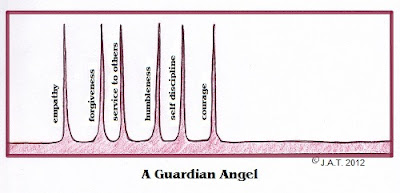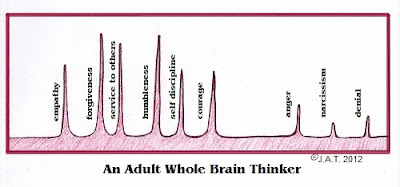RS28: For Now We See in a Mirror, Brightly
A: Okay. To sum up so far, you rejected traditional and cultural beliefs about illness and healing, left the major urban centres, moved to a small town in Galilee — Capernaum . . .?
J: Capernaum.
A: . . . broke countless religious rules about healing, didn’t use magic, ritual, or even prayer during your healing sessions, insisted on using observable science, insisted on building relationships of compassion with your patients, insisted on the power of faith, insisted on examining patients directly instead of using proxies, and rarely asked for anything in return. Many patients with neurological, psychiatric, endocrine, and autoimmune disorders suddenly got better. People thought you were a miracle worker. You didn’t believe you were the prophesied Messiah, but many other people did.

“Now there was a woman who had been suffering from hemorrhages for twelve years. She had endured much under many physicians, and had spent all that she had; and she was no better, but just grew worse. She had heard about Jesus, and came up behind him in the crowd and touched his cloak, for she said, ‘If I but touch his clothes, I will be made well.’ Immediately her hemorrhage stopped; and she felt in her body that she was healed of her disease. Immediately aware that power had gone forth from him, Jesus turned about in the crowd and said, ‘Who touched my clothes?’ And his disciples said to him, ‘You see the crowd pressing in on you; how can you say, “Who touched me?”‘ He looked all around to see who had done it. But the woman, knowing what had happened to her, came in fear and trembling, fell down before him, and told him the whole truth. He said to her, ‘Daughter, your faith has made you well; go in peace, and be healed of your disease'” (Mark 5:25-34). Victoria Park, Truro NS. Photo credit JAT 2025.
From today’s perspective, you don’t look like a religious teacher or wandering philosopher sage at all. You look like a really gifted doctor. In fact, you look to me like a really gifted psychiatrist. And I ought to know what a psychiatrist looks like, since I was married to one for twenty years.
J: I don’t deny what you’re saying. A psychiatrist’s job, after all, is to help patients examine the parts of their biology that are interfering with their ability to think, feel, and choose in balanced, holistic ways. It’s probably the most important field of medicine, though it’s usually the specialty that receives the least respect and the least funding.
A: You were a physician. A pioneering spirit in the as-yet unknown discipline of psychiatry. Yet a religious movement sprang up around you. Why?
J: Because I was a man of deep faith. I wasn’t afraid to trust God, to love God as they really are. I wasn’t afraid to open my heart to the wonder of healing. More important, I had a radically different idea of what illness and healing meant. For me, illness didn’t mean “lack of perfection.” And healing didn’t mean “acquisition of perfection.” I had an entirely different understanding of our lives as human beings, an understanding based on my observation of the natural world. For me, pain and death were not the enemy. Death was obviously unavoidable. Pain was a language, a language that spoke the truth about a person’s relationships with himself, with others, with the world around him, and with God. I saw the loss of love and trust in God as a major source of pain and suffering in the people around me. Their souls weren’t happy with the loss of relationship with God. Their bodies mirrored this lack of happiness, this spiritual pain.
The truth is that all souls need God. They need relationship with God. They need to feel that connection, that bond of love and trust. They also need to feel the same kind of love and trust in their relationships with their families and friends and community. They need to feel safe — emotionally, physically, intellectually, and spiritually safe.
The world I grew up in didn’t teach anyone to feel safe in their relationship with God, or, for that matter, safe within their own families. No community can be safe when it preaches the inferiority of women and the right to own slaves. Second Temple Judaism was no different in this regard from the Hellenistic world around us. Women had few rights. And seriously ill or disabled women had even fewer.
My daughter was born with Down Syndrome. She died at age 3 of respiratory failure. It was probably pneumonia. But she died in terrible emotional pain, terrible emotional suffering, because her own mother believed she was a curse. A curse!
Her body got sick and died, but the pain of her physical suffering was small in comparison to her emotional and spiritual suffering. She was horribly abused by her mother and her mother’s family. Not because she deserved it but because Jewish magicians said she deserved it. And I did nothing to protect her.
After she died — and there’s no doubt her mother and her mother’s mother were complicit in her death — I had to look at myself in the mirror and be honest about what I’d done — or rather, what I hadn’t done. I had to own up to my complete and utter lack of courage. And I had to deal with the constant memory of her face and her trusting smile.
I have no respect for the constant preaching from Christian theologians about the lofty preeminence of my suffering and death and resurrection. Fuck that. My contribution wasn’t my own death. My contribution was to see meaning and life in the face of death, to see transformation and forgiveness in the face of death, and to really mean it. My contribution was to find the courage to remember my daughter’s trusting smile and try to do something useful with the gift of her love. Her love — the memory and the ongoing presence of her love in my heart — was a constant source of wonder and healing for me.
Apparently my guardian angels approved of this attitude because after I spent years learning how to forgive and learning how to listen to God’s voice and learning how to follow my own inborn talent as a physician, really weird shit started to happen around me. I mean, really weird shit. Healings that were more than placebo effect (which I had started to get used to by then). I mean sudden, miraculous healings that only God can do. I was as shocked as many of my patients. But I understood in a logical, rational way what was happening. So I wasn’t afraid. I was just . . . non-plussed.
A: Why weren’t you afraid?
J: Because I trusted God. Because I could hear the voice of my own guardian angels. Because I could feel the comfort and safety of these “events” deep in my gut. Because people around me were crying in relief and gratitude. Because good things were happening to regular people. Because some of the people I helped heal began to believe in a loving God instead of a cruel, vengeful God. Because God was obviously present in small huts and green fields and all the places where God wasn’t supposed to be present. Because the only contribution we humans needed to bring to the table of healing was our kindness — our true kindness towards ourselves, towards each other, and towards God. Not many people then or now have been willing to show kindness towards God.
A: Did you understand the science of the miracle healings?
J: You mean the quantum physics of it? Hell, no. I’m an angel on the Other Side and I still barely grasp the quantum physics of it! But the science of it is there. The truthful and logical reality of the healings is there. Just because humans — and many angels! — don’t fully understand the science doesn’t mean it’s not science. It’s just a really, really advanced science.
A: A science which obviously circumvents the linear “cause and effect” of classical, Newtonian physics.
J: Divine Love and forgiveness feel like emotional gifts, but at a quantum level, they’re both related to non-locality or, as some prefer to call it today, quantum entanglement. Love and forgiveness also tie in with the soul’s sense of time and timing.
If you have no sense of time — no personal relationship with past, present, and future — it’s impossible for you, as a human being, to give and receive either Divine Love or forgiveness.
Trying to live in the moment — in other words, living in a state of denial about your own pain or somebody else’s pain — destroys the biological brain’s ability to process pain and turn it into something else, something much deeper and more proactive in the world, like, oh, say, like courage.
A: So you’d define courage, then, as the ability to shift pain into some form of healing action or choice. The ability to take action and help make the world a better place, even if it’s an emotional action, like choosing to love and forgive and trust, as opposed to a physical action, like joining the Peace Corps.
J: Yes. Courage is the choice to help God “build an ark.”
A: There’s no doubt about the amount of pain that exists in the world. So if pain is the raw material — the wooden planks — that can be turned into something deeper and more proactive, that’s one helluv’an ark we’re gonna be building.









